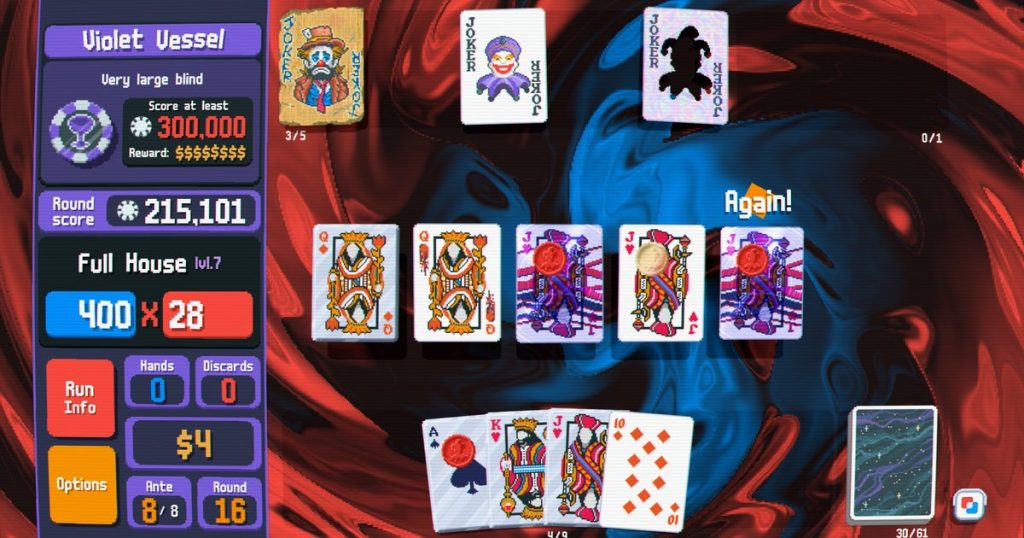The roguelikelike deck-building poker game Balatro is frankly the only game I care for right now. My head fizzes with ideas for fiendish combos and deeply illegal hands. I’m delighted by its deserved success, with the makers boasting that it sold enough to become profitable within one hour then sold 250,000 copies in 72 hours. In a recent interview, the developer claims that part of why it’s so damn successful is because they’ve barely played other roguelikelike deckbuilders so it’s free to do its own thing outside genre conventions. What’s interesting to me in this is how Balatro has built on a game which did influence it, the slot machine-building game Luck Be A Landlord.
Balatro is mostly made by pseudonymous solo developer LocalThunk (aside from music, sounds, the various publishing responsibilities, testing, localisation, and such), who recently gave an interview to GamesRadar+. One topic raised is the origins of Balatro, and the games which have—and haven’t—influenced it.
LocalThunk explained that the game which game Balatro started out based on the Cantonese card game Big Two. Then they encountered videos of Luck Be A Landlord and became, in GamesRadar+’s words, obsessed with it—but without playing it. Like Balatro, Luck Be A Landlord is a ‘make numbers do big‘ game, only you’re building a wildly complex slot machine crammed full of synergies then hitting a button and watching random chance play out. Landlord is the game Balatro has most reminded me of, so I’m not too surprised to hear that LocalThunk says they have little experience with the genre it perhaps ostensibly resembles: roguelikelike deckbuilders. They say they’ve only played genre champion Slay The Spire to check out a technical solution.
“That’s part of the reason why [Balatro] has succeeded,” LocalThunk told GamesRadar+. “I don’t know the tropes. I only played Slay The Spire last May because I wanted to understand what they did with [gamepad] controls. If I’d played that game before designing this one, it would have infiltrated the design quite a bit. I didn’t want to subconsciously take design elements from those games – and then suddenly mine is less original. Sometimes it’s good to do those things; you don’t have to reinvent the wheel. But for me, I was making this for myself for fun. I thought it’d be more fun to try myself, not as a retail thing, not ‘this is the correct thing for the game to sell the best.’ Figuring out design issues is fun for me.”
It’s a curious line of conversation because I can’t think of what Balatro would borrow from Slay The Spire. It’s distinct enough, honed in a different enough direction, that it’s hard to imagine swapping out or adding parts. Which I suppose is proof that the process worked here. But what I really like is how Balatro builds on the idea of Luck Be A Landlord and combines it with a card game.
Luck Be A Landlord is a game where you build your own slot machine, filling it with a pool of symbols that will randomly appear on the reels when rolled. Symbols have synergies with other symbols, like babies eating candy and rain watering flowers, creating cascades of combos which grow more complex and thematically weirder as you build this number-producing machine. But Luck Be A Landlord just has you hit a button to roll the reels and watch it go. As I enjoyed my time with it, doing big numbers is only fun for so long. Picking my cards, arranging my jokers, selecting upgrades, and playing my hands gives the luck machine an important and satisfying element of skill. I made that happen. I made those numbers go ding-ding-ding-ding-ding-ding. I made those score flames rise.
As LocalThunk says, mind, it’s not that it’s inherently bad to be influenced by the decisions of similar games. Most games are. But I do think attempting your own thing can result in interesting decisions, unexpected decisions, decisions that can be great or can be awful. I think both sides of ‘follow others vs. do own thing’ are interestingly realised by the metagenre of ‘7/10’ games, those games which largely follow genre conventions in a solid but unremarkable way but then do something unexpected that makes you fall in love with it. Those weird, knobbly, spikey, unexpected parts are often also parts that others really do not like. So when one of them does hit you in the right place, it feels curiously tailored to you despite being a game you absolutely can recognise is quite generic. God bless you, 7/10s. I am still lobbying for RPS to implement one single review score: a 7/10.
Balatro is out now on Steam for £13 and by god, I’ve already played my money’s worth. I’m still happily climbing the ranks of the higher difficulty levels, and trying to push deeper into Endless mode. See our Balatro review for more praise.


